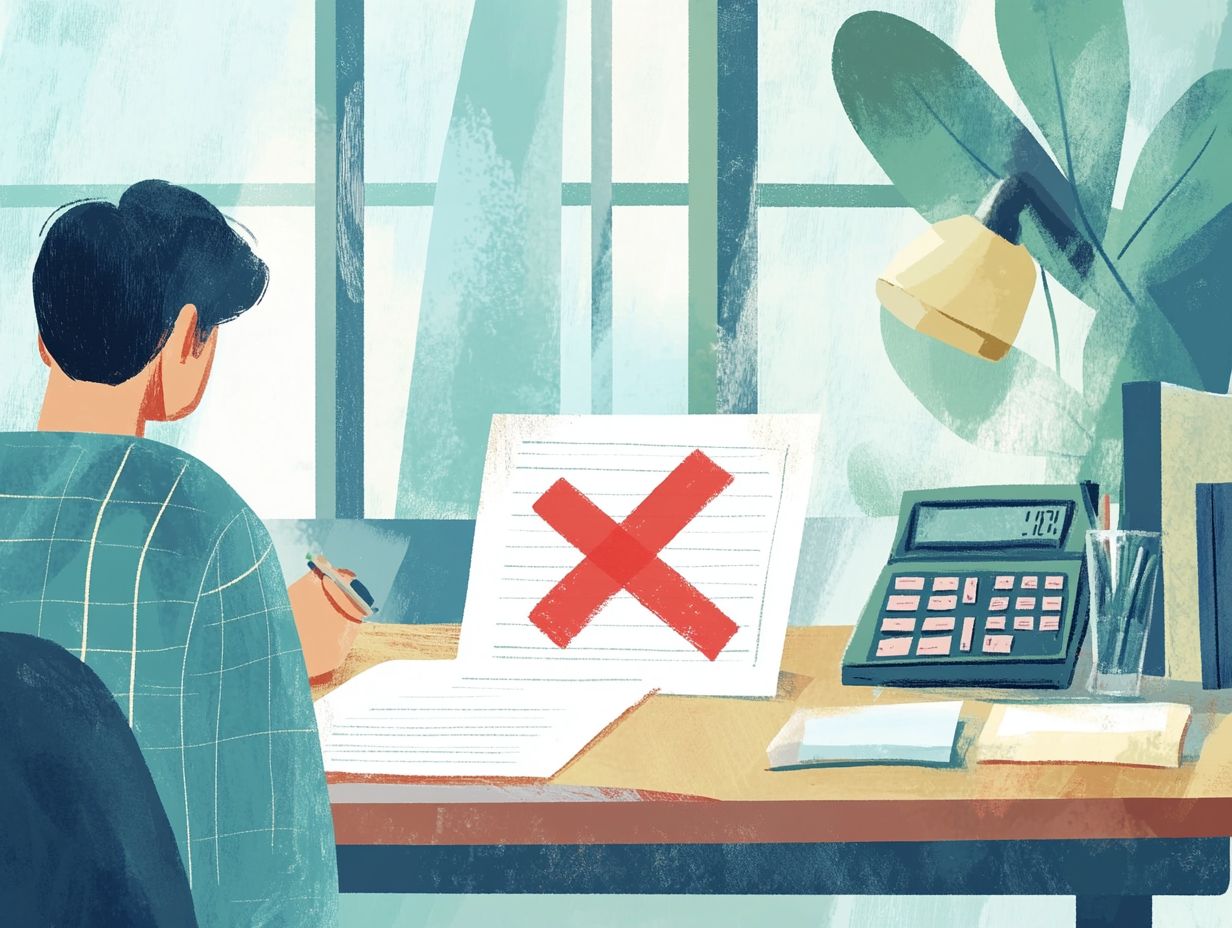How to Deal with Lowball Offers?
Negotiating can indeed feel like a delicate dance, particularly when faced with lowball offers that leave you feeling undervalued and frustrated.
This article delves into the nature of lowball offers, examining the motivations that often drive them. You ll discover effective strategies for responding thoughtfully, managing your emotions, and recognizing when it s time to gracefully walk away.
You ll find valuable tips to help you sidestep these offers in the future. Get ready to tackle negotiations like a pro!
Contents
- Key Takeaways:
- Understanding Lowball Offers
- Why Do People Make Lowball Offers?
- How to Respond to Lowball Offers
- Managing Your Emotions During Negotiations
- Knowing When to Walk Away
- Tips for Avoiding Lowball Offers
- Frequently Asked Questions
- Q1: What are lowball offers and how do they affect negotiations?
- Q2: How should I respond to a lowball offer?
- Q3: Should I immediately reject a lowball offer?
- Q4: How can I justify my asking price in negotiations?
- Q5: Is it possible to reach a compromise with a lowball offer?
- Q6: How can I avoid receiving lowball offers in the future?
Key Takeaways:

Be aware of what constitutes a lowball offer and why people make them. This will help you stay calm and focused during negotiations.
Respond to lowball offers with a clear strategy, such as countering with a reasonable price or politely declining. For more insights, learn how to handle lowball offers in real estate and don’t let emotions get in the way.
If a lowball offer becomes too frustrating or unreasonable, it may be time to walk away and consider other options. Trust your instincts and don’t settle for less than you deserve.
Understanding Lowball Offers
Understanding lowball offers is essential for you, whether you re selling or buying on platforms like Facebook Marketplace, where negotiations can get a bit tangled.
A lowball offer usually refers to an initial proposal that s considerably lower than the market value of an item or property. These offers are often a way to start negotiations.
While this practice can be frustrating, it’s often just a part of the selling journey. As a seller, you ll need to use smart negotiation strategies to keep the lines of communication open with potential buyers while ensuring you get fair value for what you re offering.
By mastering counteroffers an offer you make back to the buyer after they offer a low price and learning to respond with poise, you can navigate these offers effectively, maintaining relationships with serious buyers without driving them away.
What are Lowball Offers?
Lowball offers are those initial bids you might receive that come in well below your asking price, often designed to kickstart negotiations. In competitive markets like real estate and furniture flipping, these offers create a nuanced interaction between you and potential buyers.
Imagine a buyer eyeing your home listed at $300,000 deciding to offer just $225,000 testing your readiness to negotiate. Similarly, if you re selling a vintage chair for $200, you might find yourself facing an offer of only $100.
While these tactics can sometimes spark productive discussions, they also risk undervaluing your assets, stirring emotions and complicating the negotiation process. Knowing when to make such an offer is vital, as it can shape the entire tone of your exchange.
Why Do People Make Lowball Offers?
You may encounter lowball offers for various reasons, often rooted in the emotional mindset of potential buyers navigating a competitive market.
Understanding this perspective can shed light on their negotiation tactics and help you navigate the complexities of the selling process.
Common Motivations Behind Lowball Offers
Common motivations behind lowball offers often stem from how they perceive a property’s value, economic circumstances, or strategic negotiation tactics.
You might evaluate the surrounding market, pinpointing comparable properties that tell a different value story. This analysis can lead you to take a more assertive stance during negotiations.
Financial constraints can also weigh heavily on your decisions; perhaps you’re navigating a tight budget or dealing with unpredictable interest rates, prompting you to seek options that appear more financially viable.
By grasping how the seller might view urgency or market conditions, you can refine your approach, enabling you to seize opportunities without stretching your resources too thin.
How to Respond to Lowball Offers

Responding to lowball offers effectively requires a mix of negotiation skills and relationship-building. This is particularly important on platforms like Facebook Marketplace.
Don’t wait! Learn how to respond effectively and protect your worth today!
Strategies for Negotiating and Handling Lowball Offers
Effective negotiation strategies for handling lowball offers involve preparing counteroffers that accurately reflect the property’s true value while remaining open to dialogue. It’s also important to know how to handle low appraisals during this process.
In this dynamic process, understanding the psychology of the buyer becomes an invaluable asset. By anticipating their concerns and motivations, you can tailor your responses to address those underlying factors effectively.
It s essential to maintain professionalism throughout the negotiation. A respectful tone can significantly enhance the chances of a fruitful exchange.
Craft your counteroffers not merely as reactions but as strategic responses that emphasize the property s unique features or current market conditions, reinforcing its true worth.
Ultimately, these tactics work together to cultivate a more balanced negotiation atmosphere, fostering mutual respect and increasing the likelihood of reaching an agreement.
Managing Your Emotions During Negotiations
Navigating emotional reactions is essential when responding to lowball offers. It s natural for sellers to experience feelings of frustration or anger upon encountering offers that undervalue their property.
Recognizing and managing these emotions can significantly influence the negotiation process.
Managing Frustration and Anger
Managing frustration and anger when faced with lowball offers requires you to maintain a clear communication strategy and take a moment to reflect on the overall selling process.
Implementing techniques such as taking breaks to cool off allows you to approach negotiations with a more level-headed mindset.
Seeking advice from trusted colleagues or mentors provides valuable perspectives that can alleviate emotional strain.
By focusing on the bigger picture, you can remind yourself that one disappointing offer doesn t define your entire journey.
Encouraging a broader view of market trends may uncover opportunities for better deals down the line, reinforcing the idea that persistence and strategic adjustments often lead to more favorable outcomes.
Knowing When to Walk Away
Recognizing the right moment to walk away from a lowball offer is an essential skill for you as a seller. It demands sharp awareness of market trends and a clear grasp of your property’s true value.
Key Signs It’s Time to Move On!

Several signs may suggest it s time for you to move on from a lowball offer. If you re consistently facing a lack of serious inquiries or receiving negative feedback about your pricing strategy, it s worth considering a change.
If potential buyers regularly voice concerns about the perceived value of your listing, or if you notice a significant drop in engagement during open houses and online viewings, it’s crucial to reassess your approach.
Keep an eye on competing properties. If they’re priced attractively or selling quickly, take notice.
A lack of earnest negotiations or persistent lowball counteroffers may indicate that your current pricing strategy isn t resonating with buyers. This signals it s time to reevaluate your pricing to better align with market expectations.
Tips for Avoiding Lowball Offers
By applying effective strategies to avoid lowball offers, you can greatly elevate your selling experience and facilitate a more seamless transaction process.
Preventative Measures for Future Negotiations
To set yourself up for success in future negotiations, consider refining your pricing strategies, enhancing your property presentations, and gaining a deeper understanding of buyer psychology.
In addition to these approaches, it s wise to conduct a comprehensive competitive market analysis, an evaluation of similar properties to set a reasonable price. By thoroughly researching recent sales and current listings, you ll uncover valuable insights into pricing trends and the subtle nuances that can influence buyer decisions.
Effective communication with potential buyers is essential. Establishing clear expectations and being transparent about your property’s features fosters trust and minimizes misunderstandings.
Don t forget to create a sense of urgency by highlighting the unique aspects of your home that resonate with buyers, which can help reduce the chances of receiving lowball offers.
Frequently Asked Questions
Here, we address common concerns and queries regarding lowball offers and negotiation strategies. Understanding these can empower you as a seller.
It s important to stay informed and proactive in your selling strategy. For personalized advice, consider reaching out to a realtor or reevaluating your listing strategy based on market feedback.
Q1: What are lowball offers and how do they affect negotiations?
Lowball offers are much lower than the expected or fair value of a product or service. They can create tension between the buyer and seller, making it tough to reach a deal that works for both sides.
Q2: How should I respond to a lowball offer?

Stay calm and professional when facing a lowball offer. You can suggest a more reasonable price or politely explain why your asking price is fair.
Q3: Should I immediately reject a lowball offer?
Not always. While it’s frustrating, try to see the buyer s perspective. This could be a chance to negotiate and find a solution that benefits everyone.
Q4: How can I justify my asking price in negotiations?
Show evidence like market research, comparable prices, and the unique value of your product. This helps buyers understand your price and may lead to a fair counteroffer.
Q5: Is it possible to reach a compromise with a lowball offer?
Yes! You can negotiate to find common ground. Consider adding extra value, like additional services or products, to make your offer more appealing.
Q6: How can I avoid receiving lowball offers in the future?
Research the market to set a fair price for your product. Clearly communicate the value of your offer to potential buyers. Building a good reputation also attracts serious buyers.






